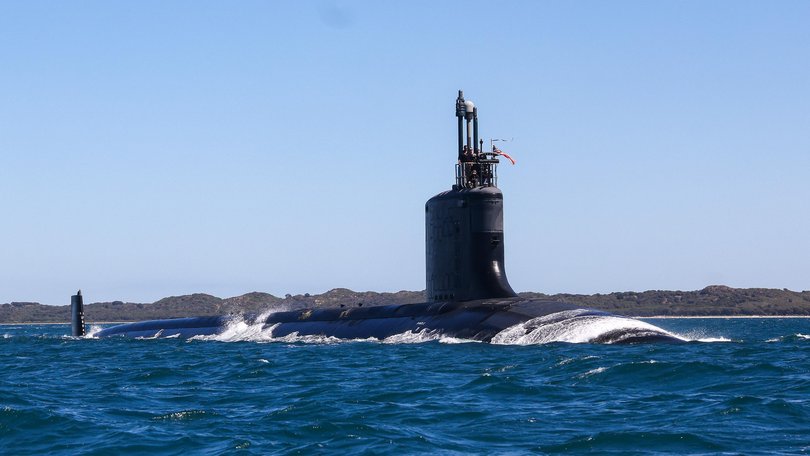NICOLA SMITH: Keep calm and Pentagon will stay on course in AUKUS submarine pact
NICOLA SMITH: Australian experts have played down the AUKUS review but warned Anthony Albanese to increase defence spending

Defence experts have played down concerns over a Pentagon review on the future of the AUKUS nuclear-powered submarine agreement, stressing the success of the trilateral pact remains firmly in the United States’ interests.
But they have also cautioned that Prime Minister Anthony Albanese needs to reassure US President Donald Trump of Australia’s commitment to raise future defence spending in response to rising strategic threats in the Indo-Pacific region.
As news of the review sparked a political furore in Canberra, analysts, industry chiefs and officials with detailed knowledge of the AUKUS process insisted the stocktake was normal procedure in a new administration and said there was no cause for panic.
Sign up to The Nightly's newsletters.
Get the first look at the digital newspaper, curated daily stories and breaking headlines delivered to your inbox.
By continuing you agree to our Terms and Privacy Policy.“Australia should not lose its mind about this and just keep some perspective,” said Jennifer Parker, an expert associate at the ANU’s national security college, pointing to the benefits for the US including force posture initiatives.
“There is a range of things in this for the US, and those things haven’t fundamentally changed. The signalling we’ve seen from the US administration has been all positive,” she told The Nightly.
Ms Parker pointed out it was concurrent with a broader national defence strategy review also being led by the same senior Pentagon official, Elbridge Colby.
While the assessment could bring up issues that were not in Australia’s interests, the “unlikely” scenario of the US reneging on AUKUS or changing major elements of it would “fundamentally impact how they are viewed in this region,” she said.
The torpedoing of AUKUS would run counter to the strong message of assurance to Indo-Pacific security delivered by US Secretary of Defence Pete Hegseth at the Shangri-La Dialogue, Asia’s top defence summit, in Singapore in early June.
“America is proud to be back in the Indo-Pacific — and we’re here to stay,” he told the region’s most senior defence officials in the room, including Defence Minister Richard Marles.
The US was committed to achieving peace through strength, which started with “deterring aggression around the world and here in the Indo-Pacific, here in our priority theatre, here with you — our allies and our partners,” he said.
While Mr Hegseth made little reference to AUKUS in his speech, he and the Trump administration have previously spoken of it in positive terms.
“It is something that I think you’re going to find very strong support for in this administration,” US Secretary of State Marco Rubio said of the three-country pact as he took up his post in January.
Mr Marles on Thursday described the US plan as a “natural” move that mirrored a similar “positive” inquiry by the British government following the election of Prime Minister Keir Starmer last year.
He confirmed the US had given Canberra a heads-up, and said Australia remained committed to AUKUS and working closely with the US as it reassessed the $368b program.
The Nightly understands the US gave its AUKUS partners several weeks’ notice of its intentions of its Department of Defence-driven evaluation, dampening any sense of alarm or doubt in strong bipartisan support.
“Is the world falling in? No,” said a diplomatic source.
Mr Marles’ mention of the British review referred to the Lovegrove Report, commissioned by the government to assess the UK’s progress towards meeting its core commitments under the project, and carried out by former national security adviser Sir Stephen Lovegrove.
The document has not been made public, although a version has been provided to the Australian and US governments.
It is understood to offer a detailed overview of how the UK can contribute to the program in a more efficient way, offering assurance and direction to its objectives.
The expectation is that US process will be a similar exercise in due diligence and evaluating the best use of scarce resources to face rising regional competition with China.
Dr Malcolm Davis, a senior analyst at the Australian Strategic Policy Institute (ASPI) said Australia should not be too concerned about the review but suggested it would be wise for the Prime Minister to signal a clear intention to hike defence spending to the US President at the G7 summit this weekend.
Mr Albanese has so far resisted Washington’s demands to raise the defence budget to 3.5 per cent of GDP as soon as possible.
But Dr Davis warned that any hedging around the willingness to spend more and increase Australia’s share of the defence burden during a one-on-one with Mr Trump could undermine the outcome of the AUKUS review.
“I do think the Trump administration will expect him to put an actual figure on it and stick to that,” he said.

